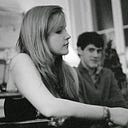Keynote on Imagination Activism at the Sociale Innovatie Fabriek Annual Congress
In October I had the pleasure of keynoting the annual System Shakers Conference hosted by the Sociale Innovatie Fabriek in Brussels on “Imagination Activism”. This article was written by the team at Sociale Innovatie Fabriek and published on their website.
This is an interview I did for Social Innovatie Fabriek before speaking at their annual congress with a 60-minute keynote titled “Imagination Activism: our Universal Power”.
Phoebe Tickell: “Imagination is the necessary force to get out of crises.”
03/10/2022
On October 21st, imagination activist Phoebe Tickell kicks off our System Shakers networking conference with a dazzling keynote on the power of imagination. Because by combining visualisation, science and art, we can help people take action. In this interview, the British-Hungarian scientist gives us a foretaste.
Who is Phoebe Tickell?
- Hungarian/English scientist and social entrepreneur.
- Graduated magna cum laude in Biological Natural Sciences from Cambridge University.
- Worked at The National Lottery Community Fund of Great Britain until 2021.
- As the founder of Moral Imaginations , she works with leaders, organisations, boards, communities and think tanks to drive change.
- Keynote speaker at our network conference System Shakers on October 21, 2022.
Efficiency versus creativity
The world is on fire, literally and figuratively. In addition to forest fires that flare up due to global warming, hot spots are popping up everywhere in our society. Poverty, childcare, waste, mobility, inclusion, mental well-being… we face a huge mountain of problems to solve. According to Phoebe Tickell, it can. But then we first have to change our mentality around those themes. We spoke to her via Zoom about the keynote she will give during System Shakers .
You believe that we can find solutions to difficult themes thanks to imagination. Explain.
“The way in which we have been organizing our lives, learning and work for decades, the way in which we organize our society, that no longer seems to work well today. As a result, we are gradually reaching a state of impasse. The good news is that together we can create a new reality. But then we have to dare to use our imagination. Imagination really is a superpower. It’s available to anyone, anytime, anywhere.”
What does an imagination activist like you do?
“I use playful methods to help people see the world in different ways, and that a different world is possible. Only when someone dares to look beyond what they already know, will they be able to change their perspective. And adjust their behaviour where necessary. Only we have forgotten how to think outside the box, for fear of doing something wrong or not according to the ‘imposed norm’. Industrialsation had a devastating effect on our creativity. We have become obsessed with efficiency and replicability, which is at odds with craft and genuine creation. Our school system also pushes creativity out of children. And then suddenly they are adults. I see a big link to the mental health problem we face today. A one-size-fits-all model is not humane. It creates a colonial system where most people people are excluded or “don’t fit the mould”.”
Does the place where you grow up affect your creativity?
“I think so. As a child I lived in Hungary, in a slightly poorer and more austere region. I spent the other half of my life in well-developed London, where everything is neatly arranged. The difference in imagination between the inhabitants is very striking. In Hungary I felt much more warmth, togetherness and creativity. When people have less, they share more with each other and look for ways to make their lives easier. Automatically they also use their hands more. So modernisation makes us sure no more creative.”
Does the government play a role in this?
“In any case, I notice a big difference between Europe and, say, South America, where there are often more links between politics and art. In Europe there is little room for deep and radical creativity. That is largely reserved for people who are paid to work in fantasy, like filmmakers or authors. Too bad, because the kind of thinking we need on a large scale to get out of our complex problems is not accessible to most people. Everyone is required to have daring, cooperation, courage, creativity and imagination, but it is not recognised that it takes time, space and practice. Imagination does not come by itself.”
How did you see the results of your work yourself?
“In the group sessions with the Moral Imaginations Lab, we use multimedia experience, sound and live artwork to tap into imagination. Last year we did a four-day journey with residents from Watchet, who all had certain issues. When I asked the group after a a few years back, many of them had really changed. One person was even elected to local politics. We didn’t tell them what to do to get on with their lives, but we did open the door to their imagination. Then suddenly there was a lot possible.”
What do you hope the audience will take home from your keynote?
“I would love it if everyone thought about the question ‘What do I need to get my imagination flowing?’ That can be anything, but it can have fantastic consequences for the rest of your life or project.”
Original article here.
